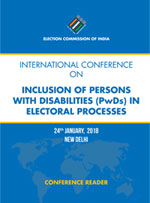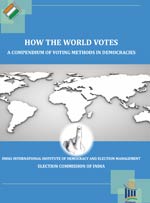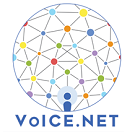
Global Knowledge Network On Voter Education - learning from each other
Introducing Biometric Technology in Elections
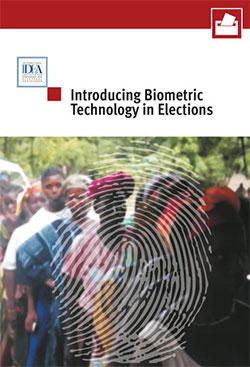 A credible voter register gives legitimacy to the electoral process and helps prevent electoral fraud.
A credible voter register gives legitimacy to the electoral process and helps prevent electoral fraud.
However, voter registration remains a complex and contested task. It is one of the most important activities that an electoral management body needs to conduct, but it is also one of the most costly in terms of both time and resources.
Many countries that face challenges in creating an accurate voter register are considering reforming their voter registration systems through the introduction of biometric technologies. The drive towards biometrics has been facilitated by its largely apolitical nature. Investing in high-tech solutions allows stakeholders to demonstrate their commitment to resolving electoral problems. At the same time, expectations on biometric solutions may be exaggerated.
This guide provides an overview of key concepts and considerations for all stakeholders involved in discussions about the application of biometrics in elections, both for voter registration before an election and for voter verification at polling stations on election day.
Published:
20 June 2017
Language:
English
Pages:
77
ISBN:
978-91-7671-098-2
Author(s):
Peter Wolf, Adbul Alim, Brown Kasaro, Pontius Namugera, Mohammed Saneem, Tamir Zorigt
Democratic Accountability in Service Delivery: Lessons from the pacific
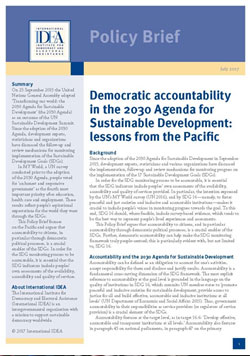 On 25 September 2015 the United Nations General Assembly adopted 'Transforming our world: the 2030 Agenda for Sustainable Development' (the 2030 Agenda) as an outcome of the UN Sustainable Development Summit. Since the adoption of the 2030 Agenda, development experts, statisticians and organizations have discussed the follow-up and review mechanisms for monitoring implementation of the Sustainable Development Goals (SDGs).
On 25 September 2015 the United Nations General Assembly adopted 'Transforming our world: the 2030 Agenda for Sustainable Development' (the 2030 Agenda) as an outcome of the UN Sustainable Development Summit. Since the adoption of the 2030 Agenda, development experts, statisticians and organizations have discussed the follow-up and review mechanisms for monitoring implementation of the Sustainable Development Goals (SDGs).
In MY World, a UN survey conducted prior to the adoption of the 2030 Agenda, people voted for 'an honest and responsive government' as the fourth most important priority after education, health care and employment. These results reflect people's aspirational expectations for the world they want through the SDGs.
This Policy Brief focuses on Pacific Island states and argues that accountability to citizens, in particular through democratic political processes, is a crucial enabler of the SDGs. In order for the SDG monitoring process to be accountable, it is essential that the SDG indicators include peoples' own assessments of the availability, accessibility and quality of services.
Published:
21 July 2017
Language:
English
Pages:
4
Open Data in Electoral Administration
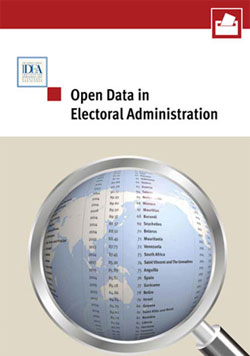 In recent years, the concept has taken root as an increasingly accepted practice for public and government produced data, with data seen as a public good, and data infrastructure as the key to accessing it.
In recent years, the concept has taken root as an increasingly accepted practice for public and government produced data, with data seen as a public good, and data infrastructure as the key to accessing it.
Publishing election data as open data has numerous benefits: it provides civil society, citizen journalists, electoral observers and citizens access to the same detailed information that was previously only available to selected stakeholders such as large media outlets. In doing so, open data allows all interested stakeholders to follow and understand the electoral process and can enable more inclusive, transparent and trusted elections.
In spite of the potential benefits of open data, election data is often not available in government open-data platforms and election data that is published often does not comply with open-data principles.
The aim of this publication is to encourage electoral management bodies to increase the application of open-data principles. It provides guidance for improving the practice of data publication towards a more open approach.
Published:
3 April 2017
Language:
English
Pages:
62
Author(s):
Liz Carolan, Peter Wolf
South Asia Regional Conference on the Use of Money in Politics and its Effects on People's Representation
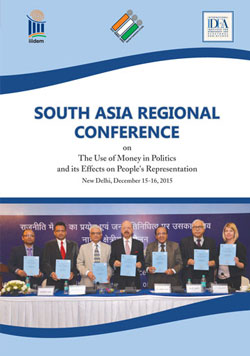 Participants from across the globe participated in discussions and shared experiences during a two-day conference on the topic of Money in Politics and its Effects on People's Representation.
Participants from across the globe participated in discussions and shared experiences during a two-day conference on the topic of Money in Politics and its Effects on People's Representation.
After detailed in-depth discussions on different aspects of the problems, the conference unanimously endorsed the New Delhi Declaration on Political Finance Regulation.
The Declaration focuses on several areas, such as the capping of funding, a holistic approach to regulations, closing the monitoring gaps and keeping in mind the interests of all the stakeholders in the process. It also underscores the need to create uniformity for all political parties and candidates by creating an improved architecture for monitoring of expenditures and contributions.
The overarching principles and guidelines which form a part of the declaration serve as a framework for all stakeholders—EMBs, political parties, media, academia, civil society organizations and NGOs to ensure compliance and adherence to the guidelines and provide an improved electoral system for voters to choose their governments without fear or favour.
Published:
1 December 2016
Language:
English
Pages:
94
Author(s):
Dr Bhagbanprakash, Dr Noor Mohammad, Mr Vivek Khare, Dr N C Swain, Saket Ambar khane
Co-Publisher(s):
India International Institute of Democracy and Election Management, Election Commission of India
Southern Africa Policy Dialogue: Money in Electoral Processes
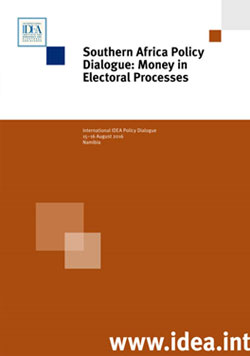 The overarching objective of this workshop was to assess the causes and patterns of money influencing elections in Southern Africa and the impact on the quality of democracy in the region.
The overarching objective of this workshop was to assess the causes and patterns of money influencing elections in Southern Africa and the impact on the quality of democracy in the region.
It sought to help identify the key electoral finance reform interventions that will require the attention of political leaders, EMBs, civil society and regional organizations such as the Southern African Development Community (SADC).
The Regional Policy Dialogue for Southern Africa on the theme 'Money in Electoral Processes' was jointly organized by the Electoral Commission of Namibia (ECN) and the International Institute for Democracy and Electoral Assistance (International IDEA). The dialogue brought together 65 experts from 11 Southern African countries. Among the participants were representatives from Election Management Bodies (EMBs), political parties, parliaments, civil society, academia, diplomatic missions, the African Union (AU) and International IDEA.
Sub-state constitutions serve similar purposes as central-state constitutions.
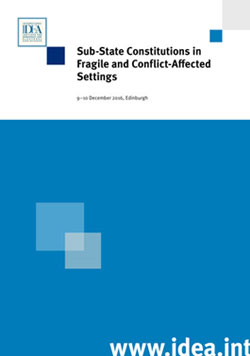 They define the system of governance of the sub-state entity, outline its institutions and define the responsibilities of those institutions. They also explain the separation of powers between sub-state institutions, and may codify citizens' rights vis-à-vis the sub-state entity.
The constitutional space can be forged in a number of ways. In some settings it is created by peace agreements between sub-state and central-state elites. In other cases, the space afforded to the sub-state entity is the result of bargains that occur outside formal peace processes but which are nevertheless the result of negotiations over how political power is held and exercised. The space may also be dictated from the top with few (or no) negotiations with the sub-state entity.
They define the system of governance of the sub-state entity, outline its institutions and define the responsibilities of those institutions. They also explain the separation of powers between sub-state institutions, and may codify citizens' rights vis-à-vis the sub-state entity.
The constitutional space can be forged in a number of ways. In some settings it is created by peace agreements between sub-state and central-state elites. In other cases, the space afforded to the sub-state entity is the result of bargains that occur outside formal peace processes but which are nevertheless the result of negotiations over how political power is held and exercised. The space may also be dictated from the top with few (or no) negotiations with the sub-state entity.
This report documents a workshop held on 9–10 December 2016 at the University of Edinburgh hosted by International IDEA, the Edinburgh Centre for Constitutional Law and the Global Justice Academy.
The workshop explored the process and design of sub-state constitutions in fragile and conflict-affected settings, and their role in the broader political settlement and/or peacebuilding process.
Voter Turnout Trends around the world
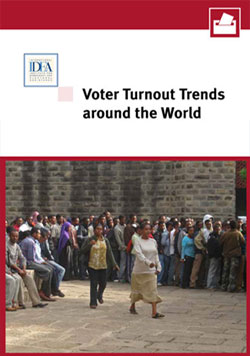 Voter turnout is an important indicator of how citizens participate in the governance of their country.
Voter turnout is an important indicator of how citizens participate in the governance of their country.
Higher voter turnout is often a sign of the vitality of democracy, while lower turnout is usually associated with voter apathy and mistrust of the political process.
This report highlights key trends and recent developments on voter turnout. By reviewing the factors that affect voter turnout, the report provides insights into how to understand complex voter behaviour. In addition, it addresses the critical need to improve how voter turnout statistics are collected, mainly referring to the need for disaggregation of voter turnout data by gender, age and other key characteristics of voters.
Data in this report is extracted from International IDEA's Voter Turnout database, which was developed in 1999 and has been continually updated. Through the database, International IDEA provide a resource that not only creates awareness about the extent of people's participation in elections, but also helps electoral stakeholders to make informed policy decisions and programmatic choices to improve the legitimacy of the electoral process.
Published:
31 December 2016
Language:
English
Pages:
54
Author(s):
Abdurashid Solijonov
First Universal Democratic Elections in Independent Georgia – 27 February 2017
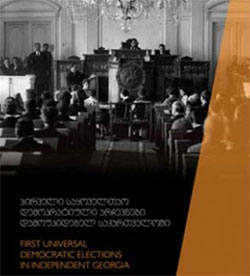 First Universal Democratic Elections in Independent Georgia offers a detailed overview of the first national democratic elections conducted in the Republic of Georgia in 1919. These elections served as an acknowledgement of Georgia's independence, which gave it autonomy for the next three years. The book portrays the spirit of multiculturalism being practiced in the lead up to and during the elections, through the development of campaign materials in several languages, such as Georgian, Farsi, Armenian and Russian, as well as allocating special quotas. It also reflects on how various ethnic groups were encouraged to represent their respective communities, with the participation of the Greek's Democratic Party in elections offered as an example.
First Universal Democratic Elections in Independent Georgia offers a detailed overview of the first national democratic elections conducted in the Republic of Georgia in 1919. These elections served as an acknowledgement of Georgia's independence, which gave it autonomy for the next three years. The book portrays the spirit of multiculturalism being practiced in the lead up to and during the elections, through the development of campaign materials in several languages, such as Georgian, Farsi, Armenian and Russian, as well as allocating special quotas. It also reflects on how various ethnic groups were encouraged to represent their respective communities, with the participation of the Greek's Democratic Party in elections offered as an example.
The first democratic elections proved to be successful in creating gender parity for women and men of Georgia. Other impressive aspects of these elections were how well structured reimbursement procedures were developed for parties and other procedures were conducted professionally, practicing the principles of equality, accessibility and accountability.
IFES Annual Report 2016
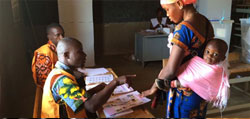 The International Foundation for Electoral Systems (IFES) supports citizens' rights to participate in free and fair elections. Its independent expertise strengthens electoral systems and builds local capacity to deliver sustainable solutions. IFES has worked in over 145 countries – from developing democracies, to mature democracies.
The International Foundation for Electoral Systems (IFES) supports citizens' rights to participate in free and fair elections. Its independent expertise strengthens electoral systems and builds local capacity to deliver sustainable solutions. IFES has worked in over 145 countries – from developing democracies, to mature democracies.
From organizing global elections organizations conference to engaging in key elections around the world, 2016 has been a jam-packed year for the organization. The IFES Annual Report 2016 documents all its efforts of the bygone year, discusses its various projects and recognizes the support of its partners for their efforts to help IFES advance its democratic mission to give a vote to every voice.
International Language Guidelines on Disability – 15 February 2017
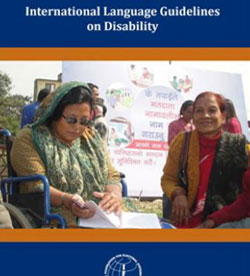 In February 2017, the International Foundation for Electoral Systems (IFES) released "International Language Guidelines on Disability," a document that includes terminology related to electoral access and inclusion in seven languages. IFES compiled standard disability terminology after working with disabled people's organizations around the world to empower them to participate in inclusive elections. The language provided within the guidelines follows the principles of person-first language, which emphasizes that persons with disabilities have equal rights as others. In some countries, local disability rights advocates might prefer terms different from those referenced in this guide. The terminology that is included in these guidelines can be used as a starting point for beginning discussions on disability rights with civil society and government advocates.
In February 2017, the International Foundation for Electoral Systems (IFES) released "International Language Guidelines on Disability," a document that includes terminology related to electoral access and inclusion in seven languages. IFES compiled standard disability terminology after working with disabled people's organizations around the world to empower them to participate in inclusive elections. The language provided within the guidelines follows the principles of person-first language, which emphasizes that persons with disabilities have equal rights as others. In some countries, local disability rights advocates might prefer terms different from those referenced in this guide. The terminology that is included in these guidelines can be used as a starting point for beginning discussions on disability rights with civil society and government advocates.
The publication also includes definitions of common election access vocabulary such as accessible formats, reasonable accommodations, and universal design. The new tool is intended to serve as an easy-to-use resource to facilitate discussions on disability inclusion in political processes.
"International Language Guidelines on Disability" is available in Arabic, Bahasa Indonesian, English, French, Kyrgyz, Russian, and Spanish.
"Sentinels of Democracy" - A unique comic book on Voters' Education
The Election Commission of India has always been emphasizing on developing innovative tools to generate awareness and educate all categories of voters, especially youth, regarding informed and inclusive participation in the electoral process. While heading a technical committee appointed for such purpose by the ECI, CEO Gujarat came up with the unique idea of telling stories through cartoons for fun filled education to the voters. The ECI decided to get 'LAWTOONs' developed and an Ahmedabad based expert agency, Research Foundation for Governance in India (RFGI) was engaged. The agency was provided with proper understanding of the content and various experiences and illustrations were shared which were relatable and realistic. It ranged from Gujarat in the West to Mizoram in the North East, Kamala in the South to Rajasthan in the North highlighting exemplary works done by the Election machinery in spite of geographical, cultural and socio-economic diversities.
The book contains interesting stories told through cartoons which include importance of enrolment as a voter, ethical voting, dedicated work by election personnel amidst various challenges and involvement of young volunteers. All stories have been narrated in a simple and lucid way that makes the book interesting and effective for the citizens and voters of all age groups.
The LAWTOONs, first of its kinds, is appropriately titled 'Sentinels of Democracy.' It has been receiving accolades from all quarters and it is aimed at making available to all through the platform of Social Media. The ECI is planning to upload stories on Facebook one by one in the near future.
The Effect of Violence on Women's Electoral and Political Participation in Bangladesh – 13 April 2017
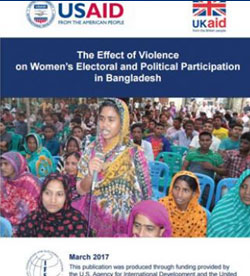 Women in Bangladesh are uniquely impacted by pervasive violence in the country's electoral process, as voters, candidates, political party supporters and activists. To explore the effect of electoral violence on women's meaningful participation, the International Foundation for Electoral Systems (IFES) convened seven focus groups of Bangladeshi women in 2013 and 2015 to discuss electoral violence they have experienced both in the home and in the public sphere.
Women in Bangladesh are uniquely impacted by pervasive violence in the country's electoral process, as voters, candidates, political party supporters and activists. To explore the effect of electoral violence on women's meaningful participation, the International Foundation for Electoral Systems (IFES) convened seven focus groups of Bangladeshi women in 2013 and 2015 to discuss electoral violence they have experienced both in the home and in the public sphere.
Under the "Bangladesh Election Support Activities" (BESA) Program, IFES has worked through two key channels to engage interested stakeholders in preventing electoral violence, sharing information on the causes of conflict and promoting peaceful political processes:
The Women Against Violence in Elections (WAVE) Advisory Group, which has worked to identify ways to mitigate electoral and political violence against women as well as ways to engage their networks and utilize their expertise to promote peaceful, violence-free elections and encourage women's participation and leadership.
The Electoral Conflict and Security Working Group, which serves as a platform to discuss successes of and lessons learned from grassroots initiatives that address electoral violence and improve electoral security, and strategies for new interventions in this area.
Unfair Advantage: The Abuse of State Resources in Elections – 5 April 2017
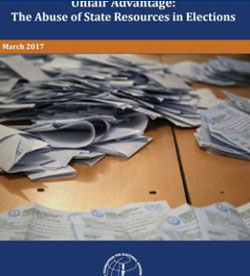 The abuse of state resources can be a major corruptive force in the electoral process, as it can introduce or exacerbate power inequalities, give unfair electoral advantage to incumbents, compromise the integrity of an election, and reduce public trust in the legitimacy of the process and its outcomes. In many countries, the abuse of state resources is not sufficiently regulated, or there are disparities between what is written in the law and what happens in practice. These gaps leave the electoral system vulnerable to manipulation by those in positions of power.
The abuse of state resources can be a major corruptive force in the electoral process, as it can introduce or exacerbate power inequalities, give unfair electoral advantage to incumbents, compromise the integrity of an election, and reduce public trust in the legitimacy of the process and its outcomes. In many countries, the abuse of state resources is not sufficiently regulated, or there are disparities between what is written in the law and what happens in practice. These gaps leave the electoral system vulnerable to manipulation by those in positions of power.
The International Foundation for Electoral Systems (IFES) publication "Unfair Advantage: The Abuse of State Resources in Elections," co-authored by former Political Finance Specialist Megan Ritchie and Center for Applied Research and Learning Deputy Director Erica Shein, represents the first step in a comprehensive effort to fill that gap. The research team reviewed the legal and regulatory frameworks of a range of countries and specifically focused on provisions related to the appropriate use of a state's institutional and financial resources, including restrictions on state personnel, state media and official government communications to the public, and the use of state funds and physical resources.
VoICE International
VoICE international, a VoICE.NET e-publication, was released by Dr Nasim Zaidi, the Chief Election Commissioner of India at the International Seminar on ‘Strategies on Empowering Young and Future Voters’ held on 24th January, 2017 at New Delhi, India. This quarterly global magazine on Voter Information, education and participation was launched on VoICE.NET platform as a part of the National Voters’ Day celebration. The theme of the inaugural issue of VoICE International was akin to the seminar ‘Empowering Young and Future Voters’. VoICE.NET (Voter Information, Communication and Education Network) is a global knowledge network on voter education with twenty three members which includes Election Management Bodies (EMBs) and other international institutes such as International IDEA, UNDP and IFES. VoICE.NET emanated from the collective resolve of participating EMBs, international institutions and experts in the form of the Delhi Declaration, the two laudable achievements of the October 2016 International Conference on ‘Voter Education for Inclusive, Informed and Ethical Participation’ held at New Delhi.
Unfolding Indian Elections – JOURNEY OF THE LIVING DEMOCRACY
Unfolding Indian Elections – Journey of the Living Democracy, is a coffee table book that has been put together painstakingly by Election Commission as a tribute to the nation and the people on the occasion of its 70th year of independence and has been published by the Publications Division. It is an election memoir celebrating the spirit of participatory democracy and capturing memories through the years. The book traces the long journey of the evolution of elections– bringing to light through rare photographs, not just how Election Commission planned and conducted the elections, but also emphasises the uniqueness, conceptual development and people’s enthusiasm for them. Thematically organized 11 sections with a set of photos and a concise chapter takes the reader through the journey of elections.
INSIDE THE BALLOT
A genuinely Brazilian equipment, the electronic ballot box was created to add ease, agility, transparency and security to the electoral process, eliminating the risk of fraud, which historically placed the results of the elections under suspicion. Both the hardware of the ballot boxes and the various programs that integrate the electronic voting system were designed and built under the guidance of the Superior Electoral Court. In addition to telling the story of the process of computerizing the vote in Brazil, the booklet aims to clarify the main doubts of the voters regarding the moment of voting and to present the various procedures performed to ensure the security of the elections, including the tests and the Audits made in the system.
WOMEN IN BRAZIL – FEMALE VOTE.
Considering that elections have taken place in Brazil
since the first Portuguese village was founded in America
in 1532, we find that women have exercised political
rights for a very short time. So, how to explain the
current scenario in which women occupy important
elective positions and represent a majority in the
Brazilian electorate?
This question leads to others: when were these rights
extended to women? What was discussed in the battles
for the female vote? Why did not you fight for this right
in the past? To answer these questions, one must
investigate the different ways in which the exercise of the
vow has been experienced by men and women in these
almost 500 years of electoral history.
ELECTION REPORT 2014
With approximately 143 million voters1, Brazil is the 4th
largest democracy in the world. The Electoral Justice,
through the regional electoral courts, the electoral judges
and the servants of the Judiciary, works to guarantee
these voters the freedom to vote; To ensure that the
voter who appears on the day of the election is actually
the registered voter; And so that the vote given is, in
fact, the vote cast.
The purpose of the 2014 Election Report is to provide
transparency to the main information and activities
related to the electoral process, with numbers and data
relating to that election, without, however, making any
analysis or comparison with previous data, and without
attributing any Information.
The report is an information tool delivered to voters on
data from all stages of the electoral process. It
corroborates, therefore, the mission of the Superior
Electoral Tribunal (TSE), which contributes to consolidate the constitutional role of the
Electoral Justice, among others, to provide citizens with reports on the election, in a clear
and independent way from previous analysis of previous data.
ELECTIONS IN BRAZIL: A 500-YEAR HISTORY
This is the motive of this work: almost five centuries of elections, since 1532. In five hundred years of history, there were disputes, conquests of rights, moments of authoritarianism and cries for freedom. There were many obstacles and the actors involved in the electoral processes developed during this period. The act of voting has already been seen as an indication of superiority and an instrument of control exercised by the powerful. In other times, nobility, income, gender and literacy were some of the exclusion criteria of the select group of former voters. This book materializes the effort of the Electoral Justice directed to the rescue of the memory. The team responsible for the Museum of the Superior Electoral Court, in carrying out this work, reconstructs an important part of the Brazilian electoral history, reinforcing the vocation of this Specialized Justice to be at the service of Brazilian citizens.
International Conference on Inclusion of Persons with Disablities(PwDs) in Electoral Roll
How the World Votes
POLITICAL PARTICIPATION OF REFUGEES
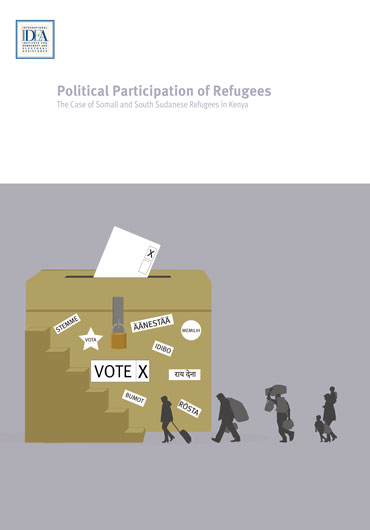 Refugees have the potential to make an impact on the political life of both their host countries and their countries of origin, as they often maintain transnational links with their homelands while at the same time becoming part of their host society.
Drawing on individual perspectives of Somali and South Sudanese refugees based in Kenya, this case study explores the formal and non-formal political participation of refugees and asylum seekers in their host country and the ways in which they are able to participate in peace building and democracy-building in their countries of origin.
Among the formal mechanisms for political participation, the case study explores issues of access to citizenship in the host country, electoral rights in both the host country and countries of origin, and membership or other forms of support to political parties. In addition, it examines non-formal mechanisms for political participation, including refugees’ participation in consultative bodies, civil society organizations, protests and grassroots initiatives, and other means of transnational political activism.
This case study is part of the Refugees, Asylum Seekers and Democracy project and has informed the development of a longer report, Political Participation of Refugees: Bridging the Gaps, published by International IDEA in 2018.
Refugees have the potential to make an impact on the political life of both their host countries and their countries of origin, as they often maintain transnational links with their homelands while at the same time becoming part of their host society.
Drawing on individual perspectives of Somali and South Sudanese refugees based in Kenya, this case study explores the formal and non-formal political participation of refugees and asylum seekers in their host country and the ways in which they are able to participate in peace building and democracy-building in their countries of origin.
Among the formal mechanisms for political participation, the case study explores issues of access to citizenship in the host country, electoral rights in both the host country and countries of origin, and membership or other forms of support to political parties. In addition, it examines non-formal mechanisms for political participation, including refugees’ participation in consultative bodies, civil society organizations, protests and grassroots initiatives, and other means of transnational political activism.
This case study is part of the Refugees, Asylum Seekers and Democracy project and has informed the development of a longer report, Political Participation of Refugees: Bridging the Gaps, published by International IDEA in 2018.
POLITICAL PARTICIPATION OF REFUGEES: BRIDGING THE GAPS
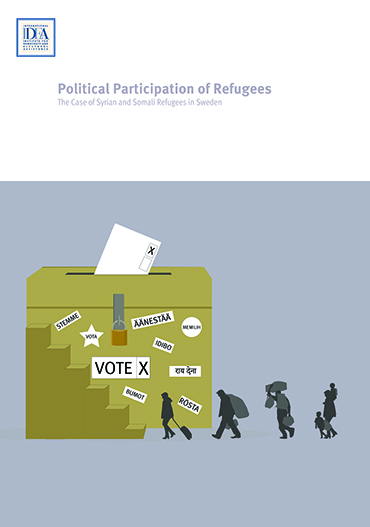 This report explores the possible answers to these questions, focusing on refugees from Afghanistan, the Democratic Republic of the Congo, Somalia, South Sudan and Syria, and their experiences in eight host countries: Germany, Kenya, Lebanon, South Africa, Sweden, Turkey, Uganda and the United Kingdom. Drawing on a total of 638 in-depth interviews with refugees and key informants, the report provides unique insights into the challenges and opportunities related to refugees’ political participation.
Recognizing the dual role of refugees as political actors, the Refugees, Asylum Seekers and Democracy project aims to explore the challenges and opportunities related to the political participation of refugees in their host countries and countries of origin.
The Refugees, Asylum Seekers and Democracy project was made possible by funding from the Robert Bosch Stiftung.
This report explores the possible answers to these questions, focusing on refugees from Afghanistan, the Democratic Republic of the Congo, Somalia, South Sudan and Syria, and their experiences in eight host countries: Germany, Kenya, Lebanon, South Africa, Sweden, Turkey, Uganda and the United Kingdom. Drawing on a total of 638 in-depth interviews with refugees and key informants, the report provides unique insights into the challenges and opportunities related to refugees’ political participation.
Recognizing the dual role of refugees as political actors, the Refugees, Asylum Seekers and Democracy project aims to explore the challenges and opportunities related to the political participation of refugees in their host countries and countries of origin.
The Refugees, Asylum Seekers and Democracy project was made possible by funding from the Robert Bosch Stiftung.
DEMOCRATIC ACCOUNTABILITY IN SERVICE DELIVERY: LESSONS FROM THE OECD
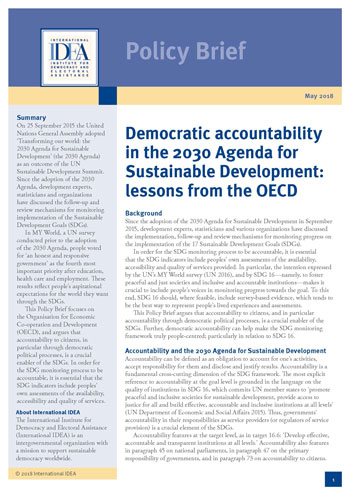 On 25 September 2015 the United Nations General Assembly adopted ‘Transforming our world: the 2030 Agenda for Sustainable Development’ (the 2030 Agenda) as an outcome of the UN Sustainable Development Summit. Since the adoption of the 2030 Agenda, development experts, statisticians and organizations have discussed the follow-up and review mechanisms for monitoring implementation of the Sustainable Development Goals (SDGs).
In MY World, a UN survey conducted prior to the adoption of the 2030 Agenda, people voted for ‘an honest and responsive government’ as the fourth most important priority after education, health care and employment. These results reflect people’s aspirational expectations for the world they want through the SDGs.
This Policy Brief focuses on the Organisation for Economic Co-operation and Development (OECD) and argues that accountability to citizens, in particular through democratic political processes, is a crucial enabler of the SDGs. In order for the SDG monitoring process to be accountable, it is essential that the SDG indicators include peoples’ own assessments of the availability, accessibility and quality of services.
On 25 September 2015 the United Nations General Assembly adopted ‘Transforming our world: the 2030 Agenda for Sustainable Development’ (the 2030 Agenda) as an outcome of the UN Sustainable Development Summit. Since the adoption of the 2030 Agenda, development experts, statisticians and organizations have discussed the follow-up and review mechanisms for monitoring implementation of the Sustainable Development Goals (SDGs).
In MY World, a UN survey conducted prior to the adoption of the 2030 Agenda, people voted for ‘an honest and responsive government’ as the fourth most important priority after education, health care and employment. These results reflect people’s aspirational expectations for the world they want through the SDGs.
This Policy Brief focuses on the Organisation for Economic Co-operation and Development (OECD) and argues that accountability to citizens, in particular through democratic political processes, is a crucial enabler of the SDGs. In order for the SDG monitoring process to be accountable, it is essential that the SDG indicators include peoples’ own assessments of the availability, accessibility and quality of services.
INTERACTIONS BETWEEN ELECTIONS AND CONSTITUTION-BUILDING PROCESSES IN FRAGILE AND CONFLICT-AFFECTED STATES
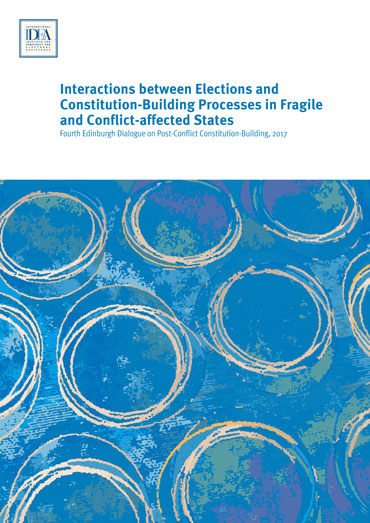 The topic of the Dialogue was ‘The Quest for Legitimate Stability: Understanding the Interactions between Elections and Constitutions in Fragile and Conflict-affected State Transitions’.
This report summarizes the issues discussed during the Dialogue, including the interaction and sequencing of elections, interim constitutions, final and amended constitutions, and referendums.
The topic of the Dialogue was ‘The Quest for Legitimate Stability: Understanding the Interactions between Elections and Constitutions in Fragile and Conflict-affected State Transitions’.
This report summarizes the issues discussed during the Dialogue, including the interaction and sequencing of elections, interim constitutions, final and amended constitutions, and referendums.
THE GLOBAL STATE OF DEMOCRACY IDEATHONS
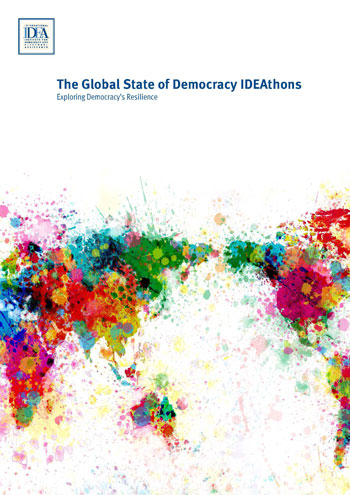 In 2017 International IDEA launched its new biennial publication, The Global State of Democracy. The first edition, focusing on democracy’s resilience, was promoted in cities around the world via a series of launches and ‘IDEAthons’: engaging, collaborative events that combined formal presentations on a topic with interactive innovation labs.
Participants in the IDEAthons—including experts, civil society actors, young influencers, policymakers, students, public officials and researchers—were encouraged to harness their collective knowledge to brainstorm concrete solutions to existing democracy challenges, by adapting the recommendations from The Global State of Democracy to their local context.
This report summarizes the main findings from each of the IDEAthons. The solutions put forward by the participants were targeted at relevant local actors, including governments, political parties, civil society organizations, the private sector and regional organizations.
In 2017 International IDEA launched its new biennial publication, The Global State of Democracy. The first edition, focusing on democracy’s resilience, was promoted in cities around the world via a series of launches and ‘IDEAthons’: engaging, collaborative events that combined formal presentations on a topic with interactive innovation labs.
Participants in the IDEAthons—including experts, civil society actors, young influencers, policymakers, students, public officials and researchers—were encouraged to harness their collective knowledge to brainstorm concrete solutions to existing democracy challenges, by adapting the recommendations from The Global State of Democracy to their local context.
This report summarizes the main findings from each of the IDEAthons. The solutions put forward by the participants were targeted at relevant local actors, including governments, political parties, civil society organizations, the private sector and regional organizations.
Breaking the Barriers: Making India Accessible
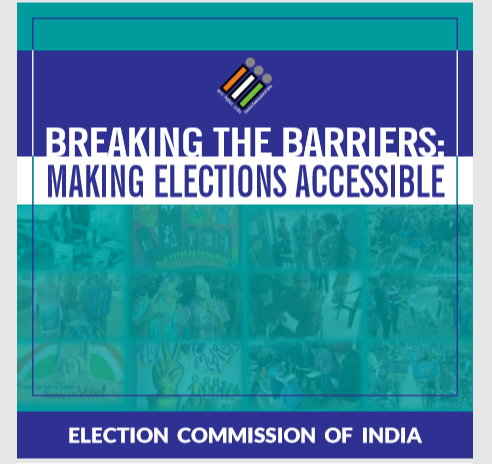 The very foundation of a democracy lies in the representation of all the communities and an indispensable part of nation building starts with the inclusion of all in its electoral process. Hence, to uphold the sanctity of free and fair elections, Election Commission of India has selected ‘Accessible Elections’ as central theme of year 2018. The theme seamlessly integrates into the underlying philosophy of universal adult suffrage and the concept of ‘No Voter to be Left Behind.’ Hitherto, the focus is to enhance participation, strengthen facilitation, mould public perceptions about the potential of PwDs, include their voice as equal citizens and set the stage for their social and economic integration. A lot has already being done, and yet a lot more has been envisaged. A well designed framework of guidelines has been put in place under the directions of the Commission for facilitating PwDs at every step in the electoral process. This booklet, Breaking the Barriers: Making India Accessible talks about the guidelines, ECI’s strategy, interventions, challenges and way forward. It also brings forth the best practices from different Indian states and stories of human interest. Placing this document on VoICE.NET will help create awareness and thus contribute to the cause of enhancing electoral participation by Persons with Disabilities across all the democracies of the world.
The very foundation of a democracy lies in the representation of all the communities and an indispensable part of nation building starts with the inclusion of all in its electoral process. Hence, to uphold the sanctity of free and fair elections, Election Commission of India has selected ‘Accessible Elections’ as central theme of year 2018. The theme seamlessly integrates into the underlying philosophy of universal adult suffrage and the concept of ‘No Voter to be Left Behind.’ Hitherto, the focus is to enhance participation, strengthen facilitation, mould public perceptions about the potential of PwDs, include their voice as equal citizens and set the stage for their social and economic integration. A lot has already being done, and yet a lot more has been envisaged. A well designed framework of guidelines has been put in place under the directions of the Commission for facilitating PwDs at every step in the electoral process. This booklet, Breaking the Barriers: Making India Accessible talks about the guidelines, ECI’s strategy, interventions, challenges and way forward. It also brings forth the best practices from different Indian states and stories of human interest. Placing this document on VoICE.NET will help create awareness and thus contribute to the cause of enhancing electoral participation by Persons with Disabilities across all the democracies of the world.
National Consultation on Accessible Elections
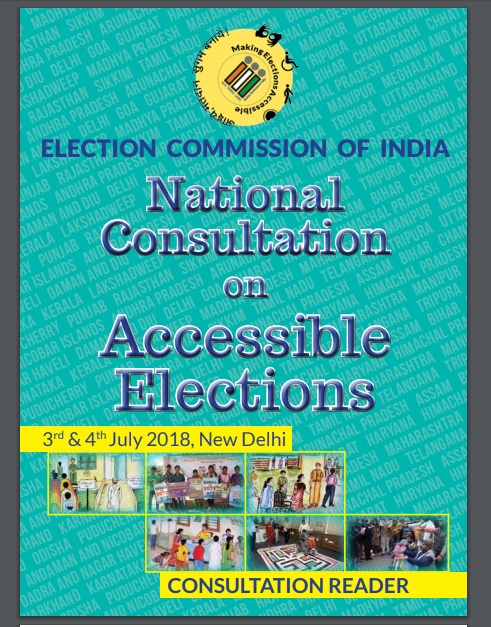 Since its inception, Election Commission of India has been making sustained effort to register all eligible citizens as voters and facilitate them to vote at the time of election. The Commission has also taken several special initiatives to facilitate inclusion of those voters who face difficulties in registration or voting. From 2009 onwards, the Commission has set up a full-fledged SVEEP division to give further impetus to this process and facilitate voters in the categories of targeted intervention, namely gender, youth, people living in slums and remote locations and Persons with Disability (PwD). The Commission always paid special attention to the inclusion of persons with disability and instructed for many provisions such as ramps at the polling stations, out of turn voting and need based companion for PwDs, engraving braille font on EVMs, braille ballot paper, and so on.
Since its inception, Election Commission of India has been making sustained effort to register all eligible citizens as voters and facilitate them to vote at the time of election. The Commission has also taken several special initiatives to facilitate inclusion of those voters who face difficulties in registration or voting. From 2009 onwards, the Commission has set up a full-fledged SVEEP division to give further impetus to this process and facilitate voters in the categories of targeted intervention, namely gender, youth, people living in slums and remote locations and Persons with Disability (PwD). The Commission always paid special attention to the inclusion of persons with disability and instructed for many provisions such as ramps at the polling stations, out of turn voting and need based companion for PwDs, engraving braille font on EVMs, braille ballot paper, and so on.
In this regard, a series of consultations with the stakeholders on ‘Inclusion of PwDs in the Electoral Process’ were conducted in districts and States across the country to identify the existing barriers and challenges, assess the implementation of the directives given by the Commission on the subject, consolidate the gains from good practices (including innovations and technological support) and for further engagement with the stakeholders. In this Consultation reader, the reports sent by the States have been documented and the same would be carefully assessed and analysed by the working groups in the National Consultation on Accessible Elections. Recommendations of the National Consultation will help the Commission in further improving the policy and action plan on Accessible Elections.
Innovations and Initiatives in Recent Elections in India
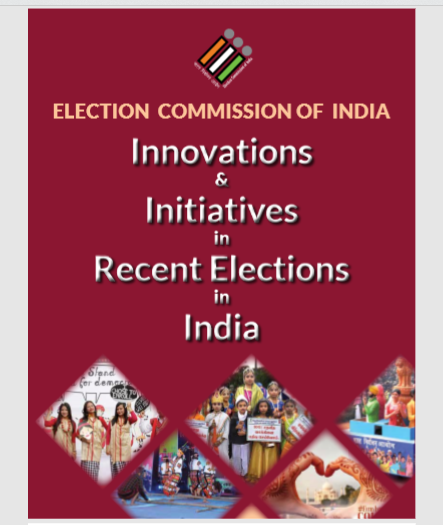 This document ‘Innovations & Initiatives in Recent Elections in India’ has been prepared to share the experience and practice of the Indian Election Management. Indian democracy with over 875 million voters and about a million polling stations has successfully witnessed 16 National Elections to the House of People and the State Legislatures. Election Commission of India, with its constitutional mandate and its strength in strategic planning and management coupled with innovation, expertise and technological integration has successfully conducted these elections in a free and fair manner for almost seven decades despite the magnitude and the diversity of operations. The document brings to you the new initiatives especially for expanding the elector base, efficiency and efficacy of the electoral management and system, improvement of standards and integrity of the process, launch of e-driven initiatives and the electoral reforms. It also shares with you the contemporary Issues and Challenges and the Strategic Plan of the ECI for 2016-25.
This document ‘Innovations & Initiatives in Recent Elections in India’ has been prepared to share the experience and practice of the Indian Election Management. Indian democracy with over 875 million voters and about a million polling stations has successfully witnessed 16 National Elections to the House of People and the State Legislatures. Election Commission of India, with its constitutional mandate and its strength in strategic planning and management coupled with innovation, expertise and technological integration has successfully conducted these elections in a free and fair manner for almost seven decades despite the magnitude and the diversity of operations. The document brings to you the new initiatives especially for expanding the elector base, efficiency and efficacy of the electoral management and system, improvement of standards and integrity of the process, launch of e-driven initiatives and the electoral reforms. It also shares with you the contemporary Issues and Challenges and the Strategic Plan of the ECI for 2016-25.
